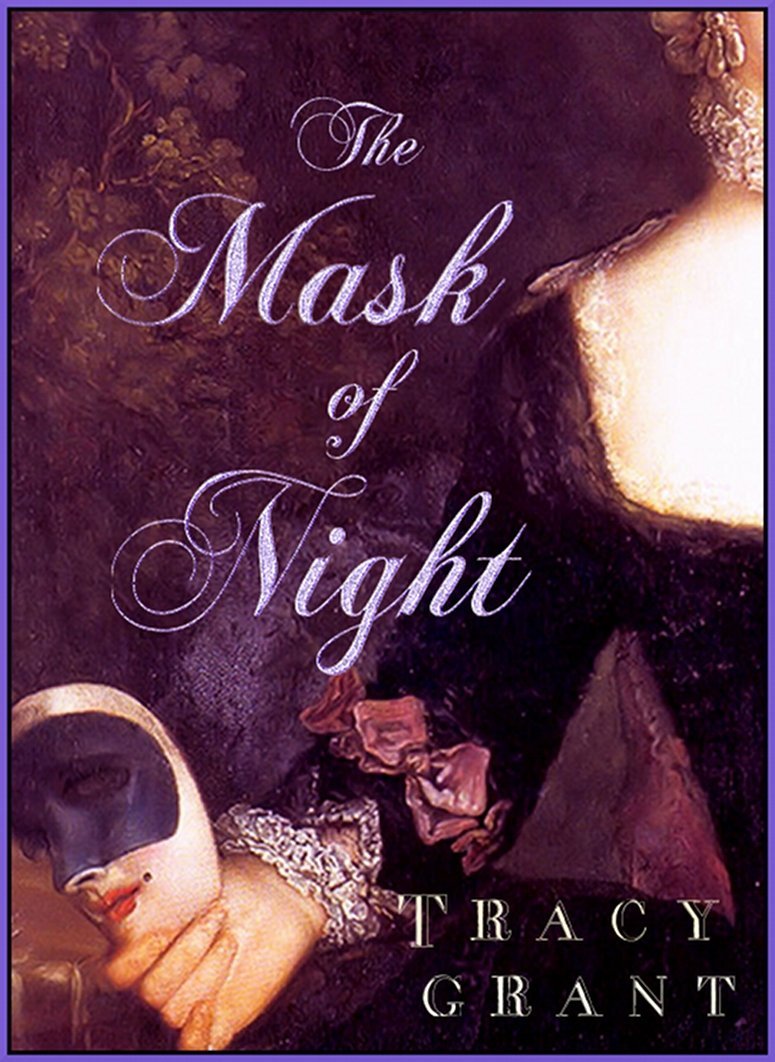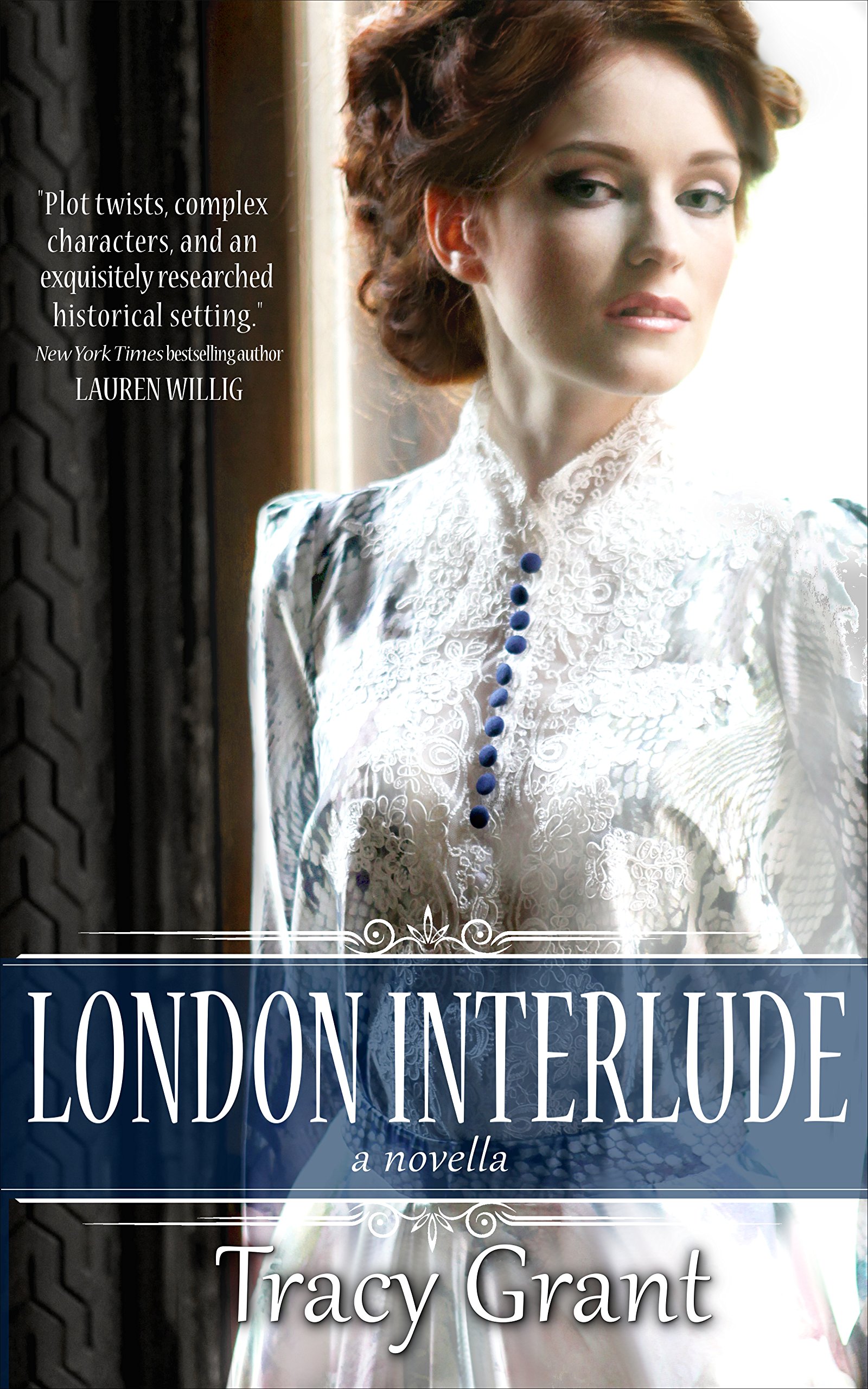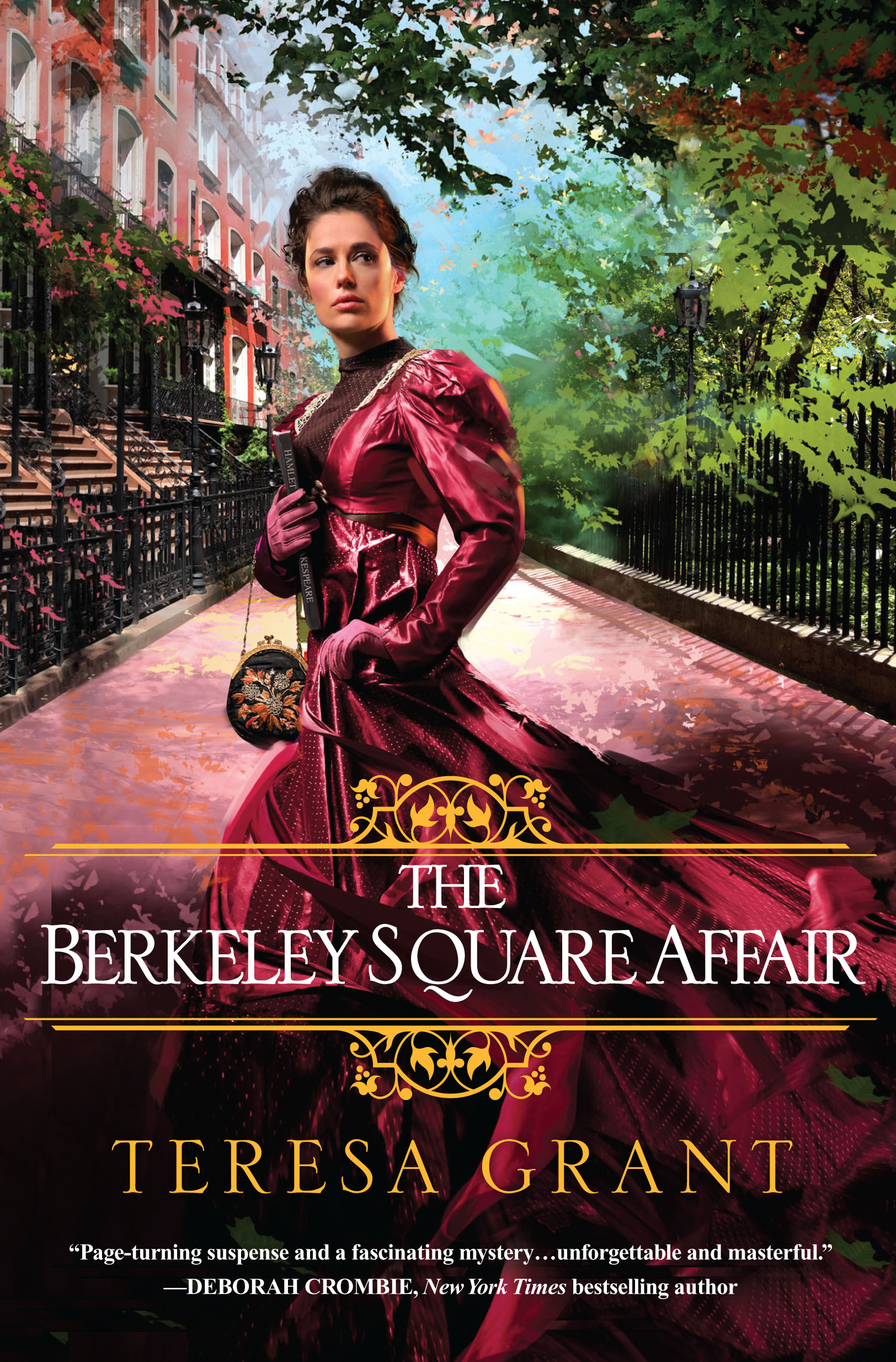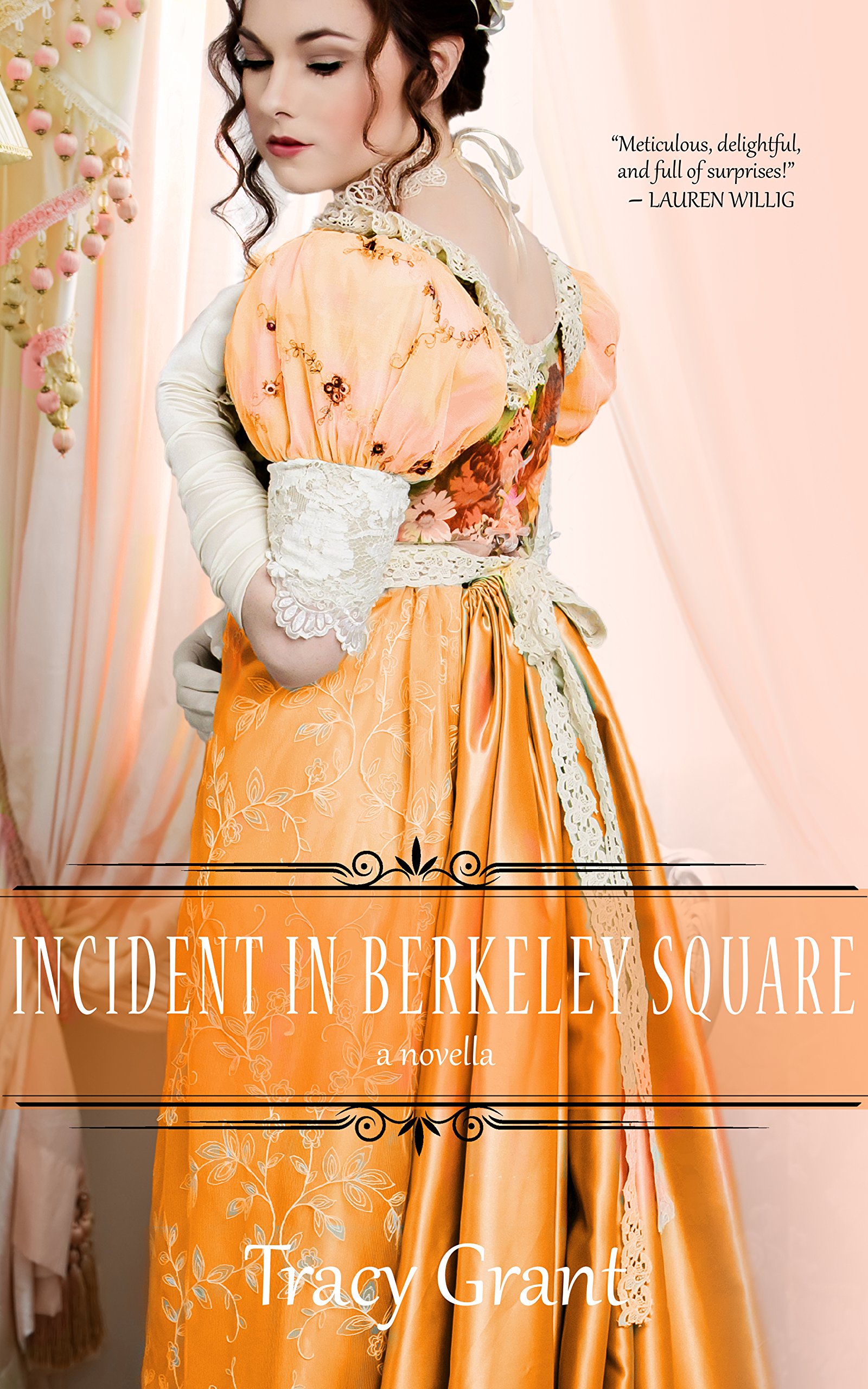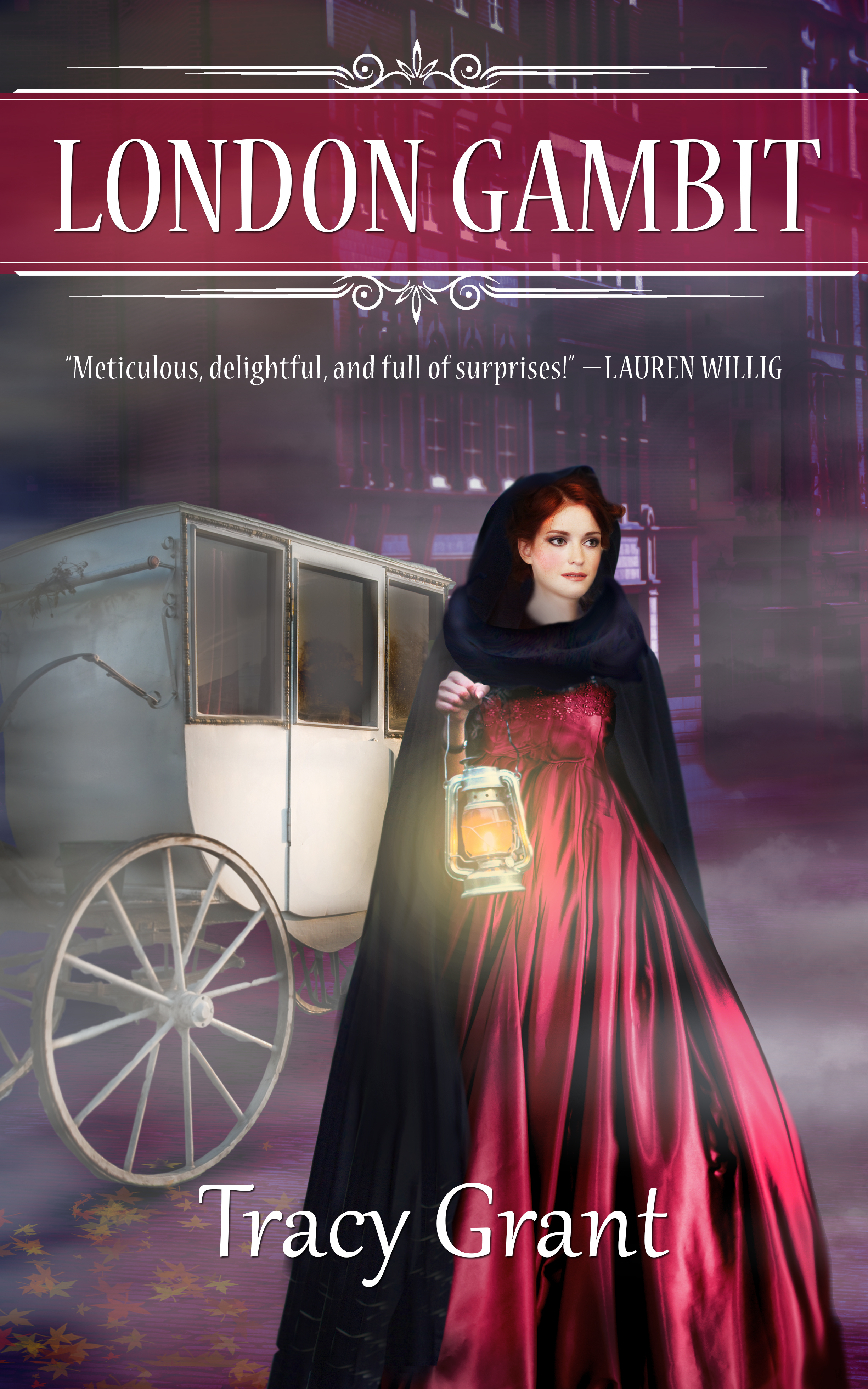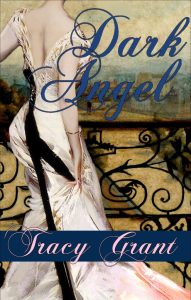Tracy Grant aka Teresa Grant
Books: Mystery | Historical | Romance | Queer
Charles & Melanie Fraser / Malcom & Suzanne Rannoch
Publication Order: Secrets of a Lady (2002), Beneath a Silent Moon (2003), The Mask of Night (2011), The Paris Affair (2013), The Paris Plot (2014), The Berkeley Square Affair (2014), London Interlude (2015), The Mayfair Affair (2015), Incident in Berkeley Square (2015), London Gambit (2016), Mission for a Queen (2016), Gilded Deceit (2017), Midwinter Intrigue (2017), The Duke's Gambit (2018)
Chronological Order: London Interlude (1814), Vienna Waltz (1914), Imperial Scandal (1815), The Paris Affair (1815), The Paris Plot (1816), Beneath a Silent Moon (1817), The Berkeley Square Affair (1817), The Mayfair Affair (1818), Incident in Berkeley Square (1818), London Gambit (1818), Mission for a Queen (1818), Gilded Deceit (1818), Midwinter Intrigue (1818), The Duke's Gambit (1818)
Rewritten: Secrets of a Lady (1819), The Mask of Night (1820)
The Lescaut Quartet: Dark Angel (1994), Shores of Desire (1997), Shadows of the Heart (1996), Rightfully His (1998)
Widow's Gambit (1998)
Beneath a Silent Moon (2003)
Set in London, 1817
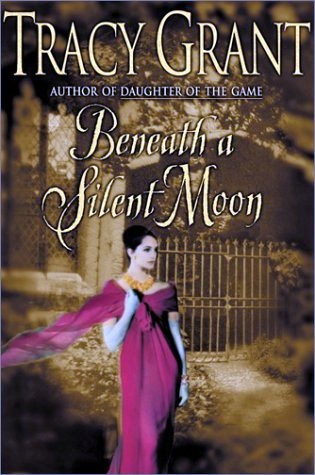 This series is somewhat confusing, as the author has published it under two different names (Tracy / Teresa Grant) and the main characters have two different names (Charles & Melanie Fraser / Malcom & Suzanne Rannoch).
This series is somewhat confusing, as the author has published it under two different names (Tracy / Teresa Grant) and the main characters have two different names (Charles & Melanie Fraser / Malcom & Suzanne Rannoch).
It is, however, the same series.
Additionally, the books were written and published NOT in chronological order, so tidbits that appear briefly may have been / might be developed in another book.
That said, you don't have to read the books in any order (which is good, because I've been reading them as they've gone on same, which is about as random a reading order as you can get).
In this book, taking place primarily in 1817, Charles & Melanie are in London, Charles' home, when Charles' father drops a shocking surprise on family and friends. Then Charles & Melanie receive another unpleasant surprise when they meet with someone who they they sometimes worked with on the Continent during the war.
Then they travel to Charles' home, and things unravel further.
If you think that in the old days people were prim and proper and well-behaved, you're in for a surprise. Secret after secret is uncovered.
"The passage was built in the sixteenth century," he added a moment later.
"To smuggle priests in and out of the house?"
"In this family? Hardly. It connects to the lodge. The lord of the manor at the time was having an affair with the steward's wife."
There are also plenty of reminders that there were few love matches in British society.
She and Charles had knit themselves together in this small person in her arms. How odd that one could take a man into one's body and create a new life with him and yet wonder if one really knew him in the ways that mattered.
It's also an incredibly complex mystery, with two different threads tangled together.
I quite enjoy this series, even if I have to bookmark passages/pages to come back to later to sort out who's who (and who is sleeping with whom).
Published by NYLA
November 2013 | Rating: 8.5/10
Secrets of a Lady (2002)
Set in London in November 1819
This is the first book in the Malcolm and Susanne Rannoch (Charles & Melanie Fraser) series, but is set in a time after almost all the other books.
Because I've read a lot of the other books in this series already, I know a lot of the big surprises/reveals in the story, but it really didn't matter, because the story was good, and I didn't know how the secrets would be revealed.
Mélanie Fraser is a devoted wife to Charles and mother to Colin and Jessica, but beneath that perfect exterior lies a tremendous secret that could destroy her life–Melanie was a French spy during the war, while Charles was a British attache who did a deal of spying during the war himself.
Something of importance to note: bad things happen to a child in this story. It's actually the reason I held off reading this book for so long, because books set later in time refer to this incident, but although it IS horrible, it's not as horrifying as I feared.
I recommend this book, but I'll admit I've enjoyed the other books in this series more.
Published by HarperCollins
September 2015 | Rating: 8/10
The Mask of Night (2011)
Again, a reminder that this is a somewhat confusing series to read, as the publication order and chronological order are not related.
The main portion of this book is set in 1820, but there are flashbacks going back to 1809, which provide bits and pieces of the back-story.
We get continuing cast of many of the characters I've come to appreciate:
Simon strode back into the center of the library. "Look, Charles, your story's a coherent scenario. As a dramatist, I appreciate the narrative construction. But as one of the principals, I feel compelled to point out that it contains barely a shred of truth."
And as with the previous mysteries, things are convoluted and complex ans many different plots are hatched by many different people.
"I thought you and Mélanie might think I'd arranged the whole thing to cover my own complicity."
"We did wonder."
"I'd have been disappointed in you both if you hadn't. Has it occurred to you that that might still be the case?"
"That you set all this up and are sitting here nursing me in the dark to win my trust for some nefarious purpose? If you're that devious, I haven't a hope in hell of keeping up with you."
It takes awhile to sort everything out, and the amount of conniving and scheming and nefarious dealings are startling, but not particularly unexpected for that time. (Consider that dotted throughout the story, are historical facts.)
I'm really enjoying this series, and I like that I can read the books in any order.
Published by NYLA
November 2014 | Rating: 8.5/10
Malcom & Suzanne Rannoch
London Interlude (2015)
This is a very short story. 77 pages according to Amazon. So just be aware of what you are getting.
This is the 8th book in the series, but set towards the very beginning of the overarching story, and probably a good introduction to the characters, if you are not familiar with them.
Susanne and Malcolm are visiting London for for the first time as a married couple, and Susanne meets many characters we've seen throughout the series, for the first time.
We also briefly meet Alistair, Malcom's father, who was just as icky as you'd think he was.
But it is a very brief story.
Published by NYLA
August 2015 | Rating: 7/10
The Paris Affair (2013) 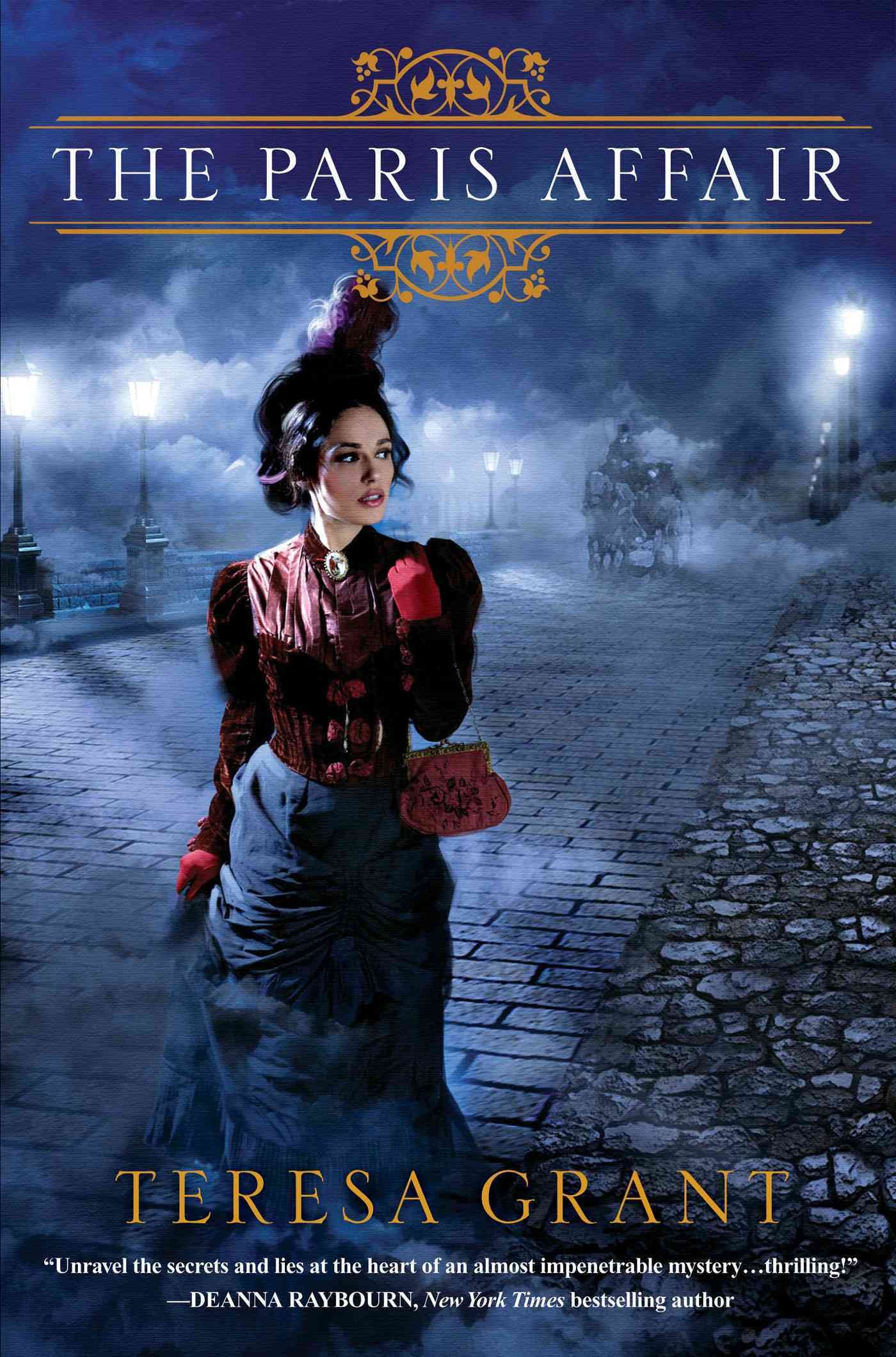
Set in Paris in 1815.
Malcom & Suzanne Rannoch are in Paris in Paris, following the Battle of Waterloo. They are supposed to meet with a French informant who wants out of Paris, and is willing to blackmail multiple members of the British diplomatic corps in his effort to leave. He also gives Malcolm a bit of intelligence to spur him on as well–his half-sister may have had a child.
First, the Dramatis Personae was invaluable, because there are a LOT of characters, and many of them are related to each other, through complex histories of marriages and re-marraiges and bastard children. Really complex. It took me a long time to get the characters straight, and even towards the end there were a couple people who I couldn't keep straight.
However.
This isn't necessarily a flaw in the story. Marriages and re-marriages and illegitimate children were complicated, and the British aristocracy was just plain complicated with people having names and titles and referring to each other interchangeably with each. For example, Robert Stewart, Viscount Castlereagh is called Stewart, Castlereagh and Robert by different people, depending upon his relationship with those people.
That's simply part and parcel of reading historicals. (The British aren't the only ones who did this, either.)
So the ability to jump back and forth between the Dramatis Personae and the story was a huge help. And the fact that I can bring up a bookmarked page within the page of the ebook I'm reading is even better, but that's my personal preference.
Additionally, the mystery was really complex and complicated, although in a way that was perfectly appropriate to the time period. (Women regularly went away to hide pregnancies, and there was no DNA testing to prove paternity.) I found the twists and turns very enjoyable.
That isn't to say that there weren't occasional problems.
Take these passages, that occurred within a few paragraphs of each other:
"Our nurse hid me before she was killed.
…
He tracked down my nurse to see that she was all right and learned from her that I'd survived."
So… was the nurse killed? Or did she live to tell where he had been hidden?
But there were plenty of other passages I thoroughly enjoyed.
"You must be thinking what I'm thinking."
Paul lifted his brows. "Romantic as the idea of two minds being in tune is, I haven't the least idea what you're talking about."
Never mind the Pinky & the Brain voices I heard when I read that.
I'd also like to note that the cover is absolutely gorgeous. Stunningly beautiful AND although there is a feeling of intrigue and danger, the woman on the cover looks neither scared nor meek. Lovely.
All-in-all, it was a fun and engrossing story.
Published by Kensington Books
August 2014 | Rating: 7/10
The Paris Plot (2014)
Set in Paris in 1816.
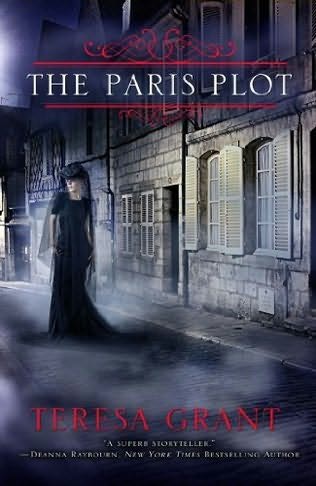 I actually read this back in August, but had forgotten to review it.
I actually read this back in August, but had forgotten to review it.
Set in Paris, in 1816, this novella finds Malcolm and Suzanne Rannoch awaiting the birth of their second child. However, events from the past have come back to haunt them, when a thrown rock with the note "You'll pay for your crimes" is thrown a Suzanne as they are alighting from a carriage.
The problem is that each member of the household assumes the note and rock were directed at them.
Although only a novella, I quite enjoyed checking in with the characters I first met in The Paris Affair. I have yet to figure out how I'm going to read more books in this series, as they weren't written in chronological order.
Published by Kensington
November 2014 | Rating: 7/10
The Berkeley Square Affair (2014)
Interestingly, this is a re-writing of her first book, Secrets of a Lady, so I was slightly confused for awhile, until I realized what was going on.
I actually like this better than the original book, partially because she didn't take the "easy" way of having a child in jeopardy to bring the main characters back together after secrets were exposed.
And there is quite a bit of awfulness.
"(T)that applies to your father as well."
"Perhaps. Save that I long since came to terms with the fact that Alistair didn't love me."
"You can't know— I mean at times everyone thinks their parents—"
"Quite. Save that in my case Alistair admitted it flat out."
Crispin stared at him.
The relationships between members of the nobility were also somewhat horrifying.
"I told him I'd been Alistair's mistress first, so even though I thought exclusive rights were something claimed by colonial powers, not mature adults, if he was going to get in a huff about betrayal he'd have to get in line behind Alistair and my husband, to name only two with a prior claim." She took a sip of whisky and coffee. "I'm afraid that didn't improve the situation."
Though in so many ways, that makes sense, since these were arranged marriages from which there was no divorce.
The mystery was better than in the original version, and the characters were (of course) more developed, since they've had several books to grow their relationships.
I also found the start of the mystery–a lost early version of Hamlet quite interesting as well.
Published by Kensington Books
September 2015 | Rating: 8/10
The Mayfair Affair (2015)
Malcolm and Susanne Rannoch have had a difficult three months, after Malcolm finally learns that Susanne had been a French agent. But when their governess is accused of murder–found on the scene in fact, they hope the tenuous peace between them won't be shattered by their investigation into what really happened to Duke Trenchard.
First and foremost, there was one anachronistic phrase in the book that irritated the crap out of me, mostly because I know the history and find the phrase itself incredibly irritating.
Half of an investigation is asking questions outside the box.
That phrase dates back only to the 1970s, and is entirely overused. So that bugged me to see the phrase there.
Otherwise, is was another enjoyable historical mystery. Although, as always I'm reminded how glad I am to live in the future.
It's damnably difficult for a woman to get out of a bad marriage. Money and family help, but even with a legal separation, she'd be likely to lose custody of her children. I find the thought intolerable in general.
Yes, there are still plenty of problems, but I am so glad I don't live in the society of 200 years ago.
(Y)ou can't undo a move once it's made. All you can do is look at where you are on the board and make the best move possible given your past choices.
Be aware if you are starting this series, that the publication order is not the timeline order, and that the main characters change names depending upon the publisher and/or whether she is writing as Tracy or Theresa Grant.
Published by NYLA
June 2016 | Rating: 8/10
Incident in Berkeley Square (2015)
The latest Malcolm & Suzanne Rannoch short story takes place after the events of The Mayfair Affair. Malcolm and Suzanne are hosting a party–an event to help introduce Laura (their former governess) into society, when Raoul and two other spies take refuge in their library.
This is a short story, so it is a small intrigue that is the mystery, but it was still fun to see how the characters deal with the unexpected–and with each other.
"If I imply you're nursing her that will be sure to deflect questions. Amazing how squeamish that can make some people—including many of the gentlemen who don't think twice about looking down one's bodice when one isn't feeding a baby."
I will admit that an anachronism in this book started me off on a long discussion with Michael about how hard it would be to develop a program that highlights words that came into use after the book was set. Mostly because this is the second time this author has done it to me, this time with the word introvert, which is most definitely a 20th century word.
It seems to me that someone should be able to develop this.
Published by NYLA
January 2016 | Rating: 7.5/10
London Gambit (2016)
In the Malcolm & Suzanne Rannoch timeline, this book does not go back into the past, but continues to follow events after the short story Incident in Berkeley Square.
Teddy Craven, David's oldest nephew and ward, has fled Harrow, because he can no longer handle the teasing after his parents' deaths, but when he sneaks into his father's warehouse in London, he discovers a body, and Malcolm is called out by Jeremy Roth to help investigate (and help with Teddy).
Susanne is called out because Bertrand has an injured man who he had helped to flee France, and wants Susanne's help in settling him in.
We also get to see David and Simon becoming parents of David's wards.
"If we'd woken up sooner we could have helped," George said.
"And I have no doubt you would have," Simon said. "But in some ways perhaps it's as well the man got out the window. I'm not sure we have enough rope in the house to have tied him up."
Amy frowned in consideration. "We would have used the window cords."
And how they are working out their relationship in light of these momentous changes
Lady Clare as good as told me—" He bit the words back. It was too much, even to share with Simon.
"What?" Simon asked.
David looked up and tossed down the last of his brandy. "She implied that she knew about us. And that she'd be quite comfortable with our continuing our relationship while she lived as Lady Worsley and had my children."
The conversation, and Lady Clare's complete composure in making her offer, had shocked him, but Simon nodded. "I'm not surprised. She looks a hardheaded young woman, she's been out for a few seasons, and she wants a husband. God knows there are worse compromises made on the marriage mart every day."
"Good God, Simon."
"I'm not saying I advocate it, but I can understand her making the suggestion.
One of the things I find fascinating about this series is how we see the everyday life that surrounds the lives of these spies.
"Sometimes I wonder what Harry sees in me."
"Cordy, you can't be serious."
Drusilla and Jessica were tugging a doll between them. "Share," Cordelia said.
Suzanne got up to put another doll in Jessica's hand. When she returned to the sofa, Cordelia had pulled the cherry-colored gauze of her scarf close about her.
The book ends with a huge (but not especially unexpected) change in the lives of the characters. It'll be interesting to see where this goes.
Published NYLA
May 2016 | Rating: 8/10
Mission for a Queen (2016)
 Set in London and Europe in the summer of 1818
Set in London and Europe in the summer of 1818
Malcolm and Susanne/Melanie have fled London, along with their children, Raoul, and Laura, while the friends back on London try to piece together what happened, and keep their disappearance as quiet and boring as possible.
David and Simon are still trying to work out their problems–after all it was Carfax telling Malcolm that Susanne had been a spy that caused them to leave.
In theory, the mystery is what happened to Hortense Bonaparte's bracelet, but the story is more an intermediary of everyone settling into the changes.
It's perfectly fine, but not one of the stronger stories.
Published by NYLA
- March 2017 | Rating: 6.5/10
- October 2018 | Rating: 7.5/10
Gilded Deceit (2017)
 Set in Europe on Lake Como in 1818
Set in Europe on Lake Como in 1818
This is book 13, and follows immediately upon the events of the previous novella.
Malcolm and Melanie have fled England. Lord Carfax has threatened to expose Melanie's past, so to protect her–and the whole family–they've left for Italy, with Raoul, Laura, and also Harry and Cordy. (I admit, I'm not quite sure why Harry and Cordy left, except to keep Malcolm and Mel company).
The group is unexpectedly attacked along the way, by bandits demanding they "hand it over."
They're rescued by another English group along the road (who must only have been a mile or two behind them) and since their villa is closer, our heroes meet Lord Thurston and his lover, the Contessa Vincenzo. As well as her husband, and all the various kids.
"Kit and his sisters haven't seen their father since he left Britain fifteen years ago."
"Your brother and sisters wanted to wait up. But we weren't sure how late it would be. I hope you'll have time with them tomorrow."
"That will be lovely," Diana said with a bright smile. "We've heard so much about them."
"Not really," Selena said. "I mean, where would we have heard it? Except for letters from—" She stared at Thurston, carefully plucked brows drawn together. "I don't know what to call you."
Thurston hesitated a moment. "You were quite proud of yourself for having mastered ‘Papa' the last time you saw me."
"I was three."
One of the things this story gives us is far more about Malcolm's mother than we'd had in the past.
Arabella had moods. It was years before I understood she was ill. I kept thinking I should be able to shake her out of them.
I actually liked learning about her, and seeing her from Raoul's eyes. It made her even more complex.
I think I've mentioned before that one of the things I especially like about this series is that the children are not main characters, but they add a great deal of depth to the other characters and the story.
Emily, Colin, and Jessica were all very sturdy, but losing children was a reality parents lived with every day. Laura felt it whenever one of them caught a simple cold.
I also appreciate the fact that this story gives us more clear look at the place of women in British society than other historicals do.
"It's appalling," Mary said. "What a husband can do to a wife and leave her no recourse. It's why my mother likened marriage to slavery."
Mind you, they're all still very wealthy, which makes them far far better off the most of the rest of society, but it's clear that they way Malcolm and Harry and Raoul treat the women is unusual for the time.
The characters also aren't blind to the changes that the war caused.
"I believed in what I was doing in the war. But I didn't much care for what I came back to. Former soldiers without limbs, begging in the streets. Sleeping in Hyde Park. Corn laws that protect the incomes of those with property and deny bread to families.
The mystery was rather complicated, but it's also tied in with the mysteries that have gone through the earlier books. I would NOT start here.
Publisher: NYLA
October 2018 | Rating: 8/10
Midwinter Intrigue (2017)
The 14th Malcolm and Melanie Rannoch book is a short story. It's really an interlude between the previous book and the one that follows, that gets them from Italy back to Britain (in this case, Scotland).
It also ends on a bit of a cliffhanger, which isn't my favorite, but I was able to immediately start reading the next book, so that wasn't quite so bad.
Malcolm is called back to Scotland by his sister, because their grandfather is sick.
Strathdon was wrapped in a blue brocade dressing gown, but when he turned the light caught the gleam of a pristine white shirt and an immaculately tied cravat beneath. And glittered off the crystal of the glass he held, half full of whisky.
Malcolm stepped further into the room and surveyed his grandfather, suspicion beginning to take hold in his mind. He fixed the duke with a level gaze. "Sir? You look well."
Strathdon's eyes glinted blue in the shadows. "You sound relieved. And a bit suspicious."
One of the things I particularly enjoy is that no matter how ridiculous some of the intrigues seem, we're reminded they're no more odd than the intrigues that went on at the time.
As I said, this ends on a bit of a cliff hanger, and isn't really a proper short story, but is more of an interstital story, to get us from the previous book to the next.
Publisher: NYLA
Rating: 6/10
The Duke's Gambit (2018)
 Set in Scotland and London in 1818-1819
Set in Scotland and London in 1818-1819
The end of the previous novella is start of this book. Malcolm's sister Gisèle has disappeared with a member of the Elsinore League and so Malcom and Gisèle's husband Andrew head to London to look for her. Unfortunately, events in Scotland become even more complicated, so everyone else returns to London, in the hopes that staying together will keep the safer (as opposed to leaving the children behind in Scotland with one or two adults).
Meanwhile, in London, things have gotten even more complicated.
(N)o one would summon Bow Street because Carfax was in a brothel, whatever the law."
"No," Roth said. "They summoned Bow Street because Carfax was in a room with the dead body of a young woman."
This series has reached the point where if you haven't read the previous books, you will be completely lost in the machinations of the spies and secret society and infidelities and, well, everything. It's not that any one thing here is ridiculous, it's just that a LOT has happened in the previous 14 books, and there's no way to sum it up without it sounding like crazy with an extra helping of crazy-sauce.
"And you were his mistress?" Nan asked Mélanie.
"A long time ago."
"And now he lives with you and your husband?"
"He's also my father," Malcolm said.
Nan let out a snort of disbelief. "And you were worried I'd peach about your past. No bleeding fear of that. No one would believe me if I did."
As I've said, one of the things I particularly like about this series is that the children are an important part of the lives of the characters, even if they are not particularly major characters themselves.
Laura scooped snow up in her gloved hand and tossed it back at her daughter. Jessica threw a small handful of snow at Colin that fell short of its target. Dorothée bent to help her, as Cordelia was doing with her younger daughter Drusilla.
Those small interactions scattered throughout the story present the children as independent entities who are important to the adults. They are very much not plot moppets, and the everyday activities help offset the heaviness of the various mysteries.
Also, I appreciate that the men had fought (many at Waterloo) and it's clear that society is completely unable to deal with the aftermath of what these men went through.
"I'd never experienced sheer chaos until then. I remember running my sword through the throat of a young Frenchman who couldn't have been more than sixteen. Seeing two lads I'd gone to Harrow with fall to bayonet thrusts. I still can't remember the last part. How I was wounded myself. I spent the rest of the battle with my face in the mud, unconscious most of the time, two dead comrades and a dead horse on top of me. That's the only way I survived."
The more things change, the more they stay the same.
Interestingly, I was pretty sure that the major secret of the plot was, yet the mystery surprised my anyway, which was very pleasant. (I've read quite a bit of historical fiction set in this time period, so I was aware of the possibilities.)
If you haven't read the previous book, do NOT start here. But much of the series is frequently on sale, so pick up the books as you find them, and up until about "The Mayfair Affair" (which is a rewriting of "Secrets of a Lady") you can read the earlier books in any order.
Publisher: NYLA
November 2018 | Rating: 7/10
Dark Angel (1994)
Adam Durward is the son of a English father and an Indian mother, and as such has never felt comfortable anywhere, but does have the ability to blend in throughout Europe as needed, which serves him well as a spy.
Caroline is a spoiled and irritating woman who turned down Adam for a safer and more conventional marriage to the more wealthy Jared Rawley. When Jared is accused of treason–by Adam–Caroline goes to Adam to beg him stop.
I like Adam, who has had a hard and complicated life.
"How can you laugh about it?" Caroline demanded.
"How can I do anything else?" Adam said.
But I think I prefer Emily (four) to either of the two grownups.
Emily, who had sat by quietly, tugged at Caroline's sleeve. "How did Adam's blood get mixed?" she whispered.
"Elena's going to make me look like a lady," Emily said. "Then we can play marbles."
Caroline's redeeming quality is that she will bend heaven and earth for her daughter. I'll cut her a lot of slack for that.
Interestingly, I quite liked the secondary romance, between Hawkins and his love–it was complicated, but for very good reasons.
What was good about this story was the mystery. Every time a new discovery is made, it makes the mystery even more complicated, even when you consider cui bono.
Interestingly, this story reminded me very much of the Diana Gabaldon novella "Lord John and the Haunted Soldier" which also deals with exploding cannon. The period between the American revolution and Napoleon's final defeat was a fascinating one, full of intrigue (and also lots of records, which authors can plumb to make their stories even more realistic). Pretty fascinating stuff–at least to me.
So, a pretty good mystery, despite some of the characters being irritating.
Published by NYLA
- February 2015| Rating: 7/10
- March 2016 | Rating: 8.5/10
- March 2017 | NR
- February 2018 | Rating: 8/10
- February 2019 | Rating: 8.5/10
- May 2021 | Rating: 9/10
Shores of Desire (1997)
 Set in Scotland and France in 1815.
Set in Scotland and France in 1815.
This is a boinking book, but it is also a marvelous historical mystery.
Robert Melton and his son are traveling to Scotland to try to discover why his wife was murdered. Because he is a French spy, he is traveling under a false name and not telling the truth about why he is searching for information on Lucie.
Emma Blair is a widow with a young daughter who is managing her family's household and trying to keep the feud between her family and her neighbors from blowing up into a war.
I really enjoyed the mystery here, as well as the background of the war between England and France. I especially like the look at how the French about the war and about Napoleon. The French revolution was conflicting for who wanted a revolution like the United States had, but instead got the guillotine and blood in the streets.
I quite liked Robert, who (despite being a spy) is quite honorable.
While I'm not a paragon of virtue, that's one place I draw the line.
"Seducing governesses?"
"Seducing any woman whose livelihood is dependent upon her respectability."
He also believes deeply in what the French Revolution was supposed be, which is problematic.
I also very much liked Emma, who is attempting to deal with the death of her husband, and the issues they had that were never resolved by his death.
She had never been able to believe that God had a plan for allocating loss and pain. It was easier to blame men's penchant for making war. How else to account for the randomness of death?
Another thing I particularly liked about this story was that the main characters were a widow and widower who had children–they were both grownups who knew what they wanted. And it made the romance far more realistic.
But as I said, I especially liked the mystery, and the difficulty it caused between the hero and heroine.
Published by NYLA
- February 2015 | Rating: 9/10
- January 2016 | Rating: 8.5/10
- March 2017 | Rating: 8.5/10
- February 2018 | Rating: 8.5/10
- May 2021 | Rating: 9/10
Shadows of the Heart (1996)
 This is another boinking book that is an excellent mystery.
This is another boinking book that is an excellent mystery.
Set in Scotland in 1817.
Paul Lescaut is the unrecognized bastard son of a French Marquis, Daniel de Ribard, and his childhood wish was for revenge. Unfortunately, as we see in the prologue, his revenge was not what he was expecting, and his guilt has followed him into adulthood.
When he interrupts the murder of a young woman, he then takes on the responsibility for her safety, however, the loss of her memory makes keeping her safe extremely difficult.
There is so very much I love about this.
First, the heroine is pregnant. I was very curious as to how the romance was going to work out.
Second, the mystery is again very complicated and very good.
Third, I really like Paul. He thinks he's a terrible person, but he isn't.
Robert joined the army because he wanted to change the world. I joined because I wanted to go out and smash things.
Also, I love Paul's interactions with Dugal, the young pick-pocket he ends up working with while on the run. Dugal isn't just a plot moppet, he's a central and well-developed character.
"France." Dugal bounced on the chair arm. "We're going to see the Froggies."
Amy folded her hands primly. "You won't like it there. You won't understand what people are saying."
"I don't understand what they're saying in England half the time.
I loved this bit, where an English soldier must deal with sheep.
Wilkins stared at the flock. At the other huts they'd searched, the sheep had been grazing farther afield. But the day was closing and the shepherd must have gathered them in to count. Close up, looming in the mist, the animals looked larger than Wilkins would have thought. There was something menacing about their black faces. The rams had nasty-looking horns.
Eager to be gone, Wilkins tramped out of the hut. The shepherd boy scowled at him. The sheep were bleating and stirring in what Wilkins thought was a menacing manner.
MENACING SHEEP. (Yes, I know that's actually not unrealistic as sheep are large and any group of large animals can be a threat, but it's still hilarious.)
I also liked another bit, where the female character is confronted with a dead body.
"Cold she's growing." She set the hand down carefully and passed her own over (dead person's) face, closing the staring eyes. "It's not decent else."
"I was afraid to touch her," Sophie said.
"You needn't be. She's naught but dead now. We all come to it in the end."
I liked both the compassion and acceptance in that. (Of course an older woman living her live in poverty would be unafraid of death, since she'd have dealt with it her entire life.)
I really liked this book, and highly recommend it (even with the boinking).
Published by NYLA
- February 2015 | Rating: 9/10
- January 2016 | Rating: 8.5/10
- May 2021 | Rating: 9/10
Rightfully His (1998)
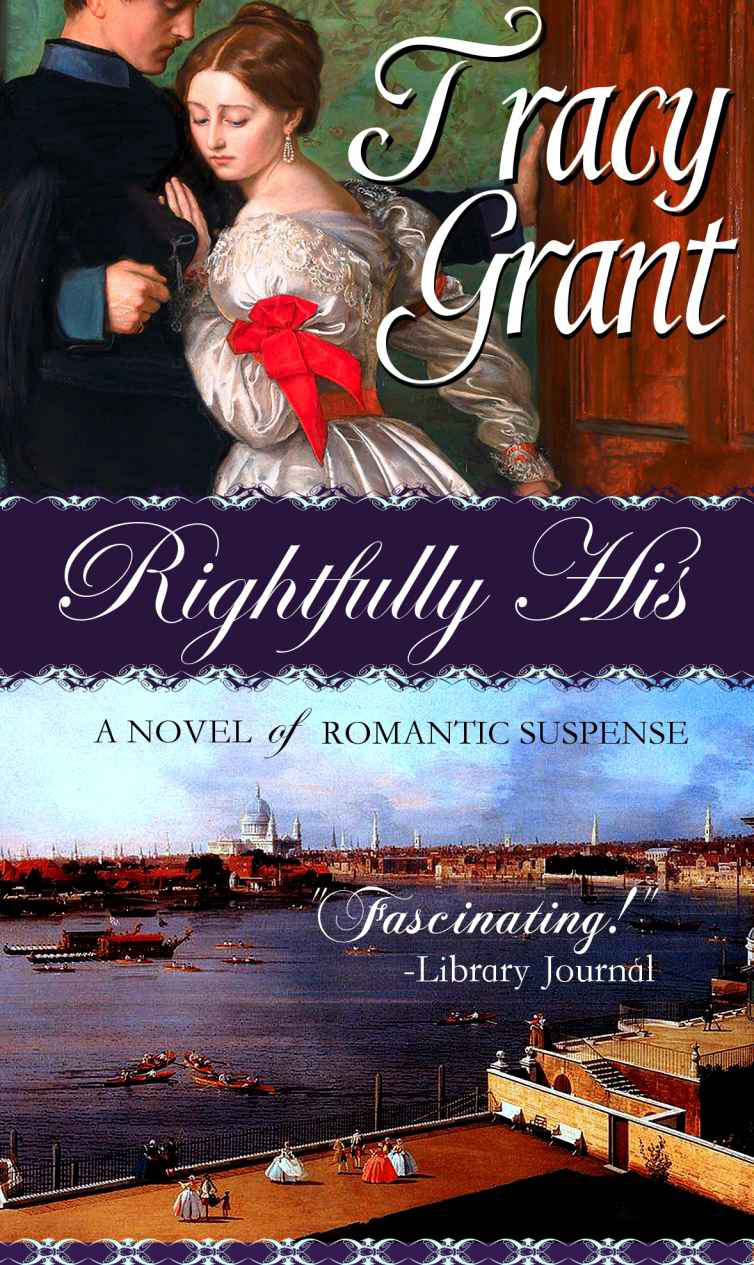 The conclusion to the Lescaut Quartet. This is a historical mystery with boinking. But not tons of boinking.
The conclusion to the Lescaut Quartet. This is a historical mystery with boinking. But not tons of boinking.
Set in London in 1812-1813
This book was set up at the end of the last book, but you shouldn't need to read the previous books in the series. Of course, reading this book will destroy some of the surprises and mystery of the previous books, so you should really read at least the previous book first. Charlotte "Charlie" de Ribard walked away from her family after her father ordered the death of her cousin and her bastard step-brother.
Francis Storbridge was secretary to Daniel de Ribard, but went on to a very good marriage and a seat in Parliament. He is now a widower with a young daughter, and he is also the guardian of his wife's younger siblings–quite a handful for a single man.
He has also been in love with Charlie since he was secretary to her father, and proposes a deal.
"You expect me to believe you want to marry me so you'll have a chaperone for your wards?"
He shrugged his elegantly disheveled shoulders. "As my wife you could hardly give me two weeks' notice."
Frank is also an advocate for the abolishing of slavery.
I don't mean to sound a horrid idiot, but I thought slavery had been abolished while I was still in the schoolroom."
Frank pulled a straight-back chair away from the table and seated himself. "The slave trade was abolished. That didn't emancipate the slaves already held in our colonies."
I actually quite liked the inclusion of these historical bits in the story, because one of the things I like about historicals is the chance to get a glimpse into what life was like at the time. I've read several historicals with bluestockings, but very few that discuss the slavery.
"We certainly believe it wise to improve the condition of the slave population and to prepare them for eventual participation in civil rights and privileges."
"Prepare?" Frank was on his feet again. "What sort of preparations does one need to be treated as a human being?"
In case you can't tell, I really liked that part of the story.
I also liked the complicated relationship between Frank and Charlie. She wants to dislike him, to hate him for the bargain they made, but the more she discovers, the harder it is to dislike him. But don't think Frank is a saint (he doesn't claim to be one) and I enjoy those discoveries just as much as the ones that put him in a good light.
In all, I really enjoyed this.
Published by NYLA
- February 2015 | Rating: 8.5/10
- January 2016 | Rating: 8/10
Widow's Gambit (1998)
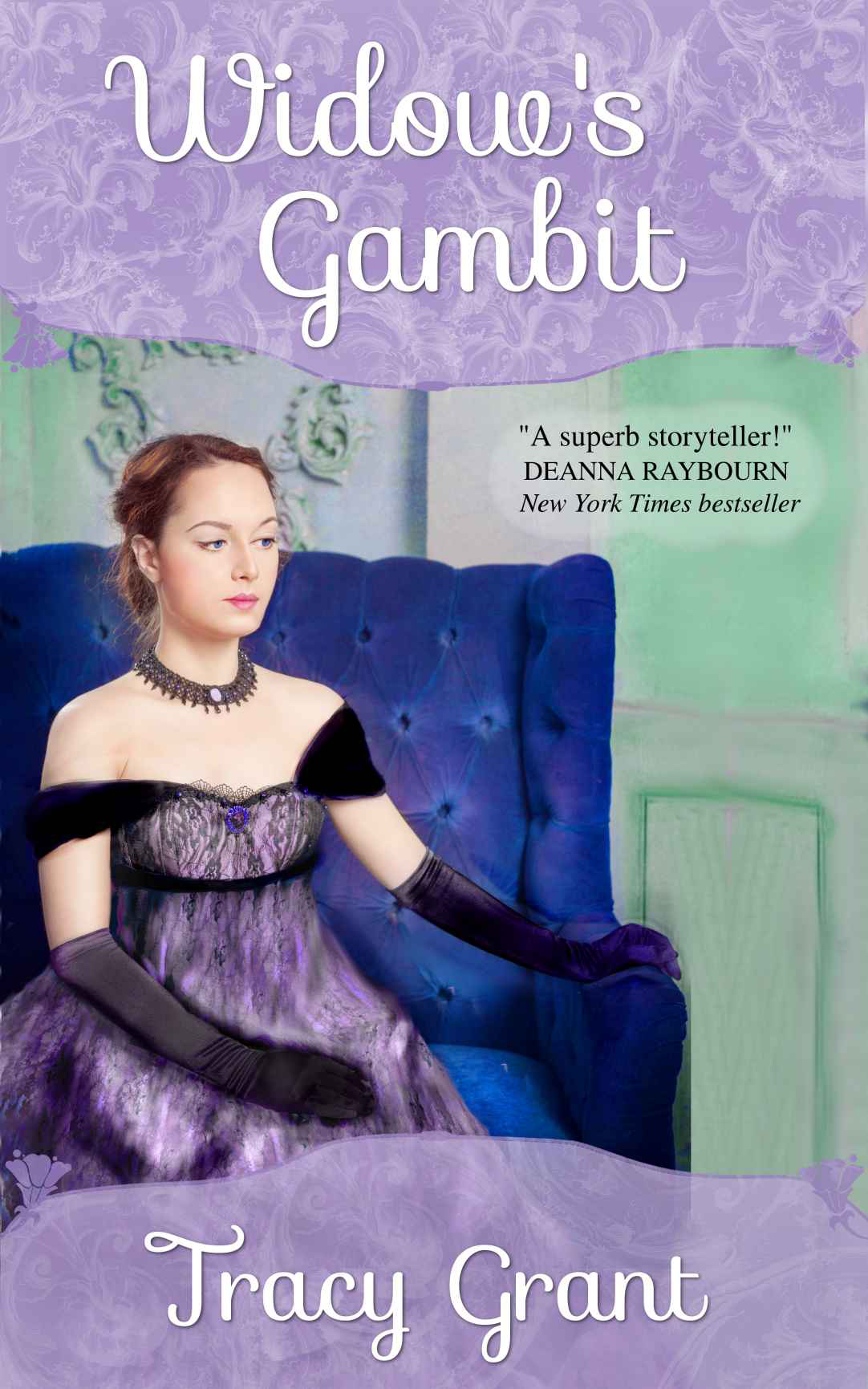 The Neville girls are of good family, but impoverished, and after their father's death are left to make their way as best they can.
The Neville girls are of good family, but impoverished, and after their father's death are left to make their way as best they can.
Claudia is the most beautiful (and Diana is not yet of age) so Livia decides to do whatever it takes to give Claudia a Season, and a chance to find a husband.
Diana said she wanted to go to London as much as her sisters did. If Livia had to acquire a dead husband to get them there, she had no fault to find with the scheme.
We have three sisters, two young men at Oxford who support their plan, an older brother and various aunts of said young man, and two younger children, both of whom have lost their mothers.
And some various other nephews and aunts and sisters-in-law.
And a butler who is an out-of-work actor.
There are a lot of characters in this book, but for the most part they are all unique personalities,
Aunt Isabel claims that one can deny anything and be believed if one does it with enough authority.
Nicholas has been sitting in the House for years and I guess he's got used to it, though I've never understood why he likes it, it seems to make him angry so much of the time…
In addition to a lot of characters, there is a lot going on. Claudia needs to find a husband, Nicholas needs a wife, Francesca needs to remarry if Nicholas is going to take a wife, and many many other things.
Oddly, however, it didn't get too muddled, and it was amusing. It wasn't one of the best historical romances I've read–and certainly not up to what I've come to expect from Tracy Grant, but this is an older book, and you can see the kernel of the writer she'll become in there.
If you've read other Tracy Grant stories, be aware this is an early work, but it is fun.
Published by NYLA
Rating: 7/10

